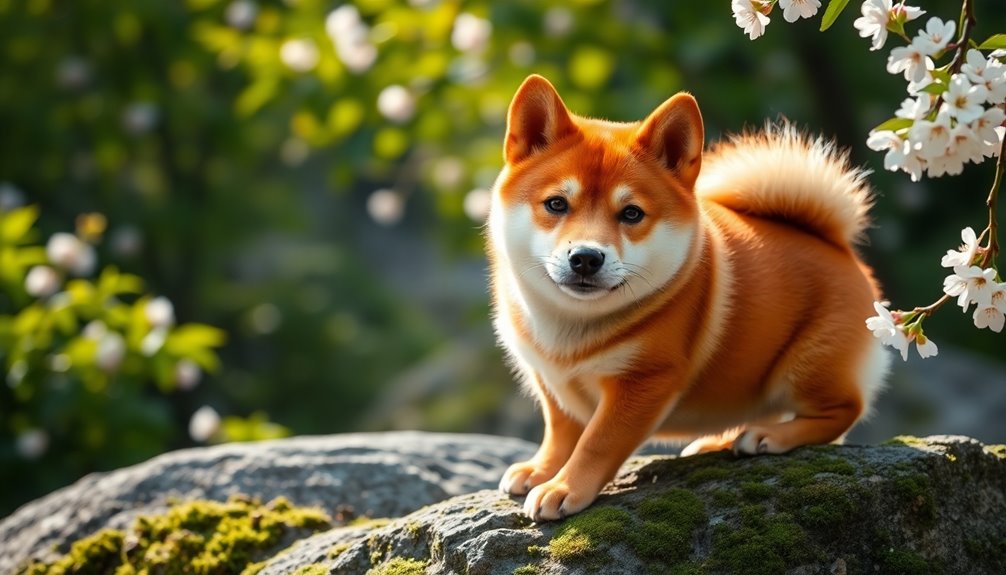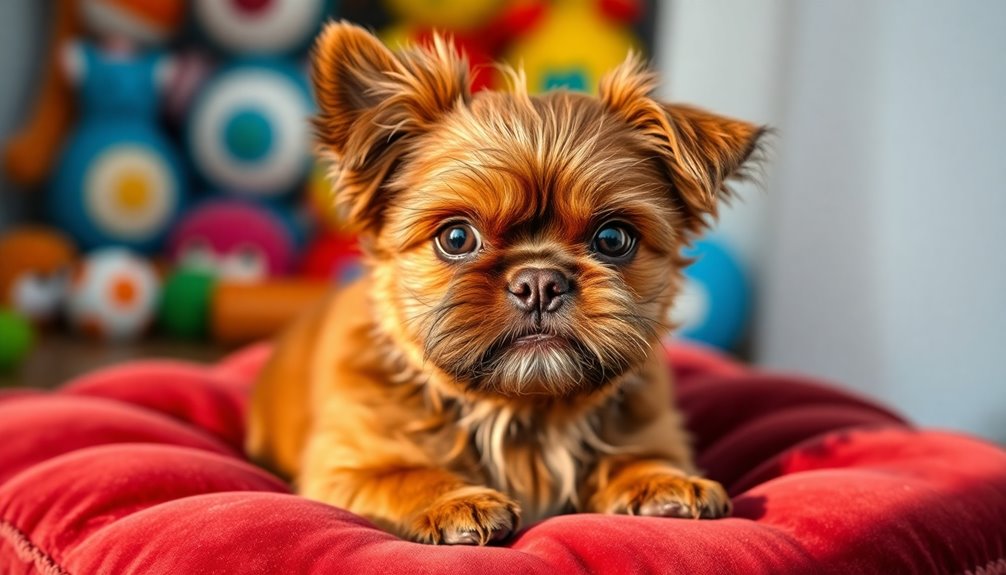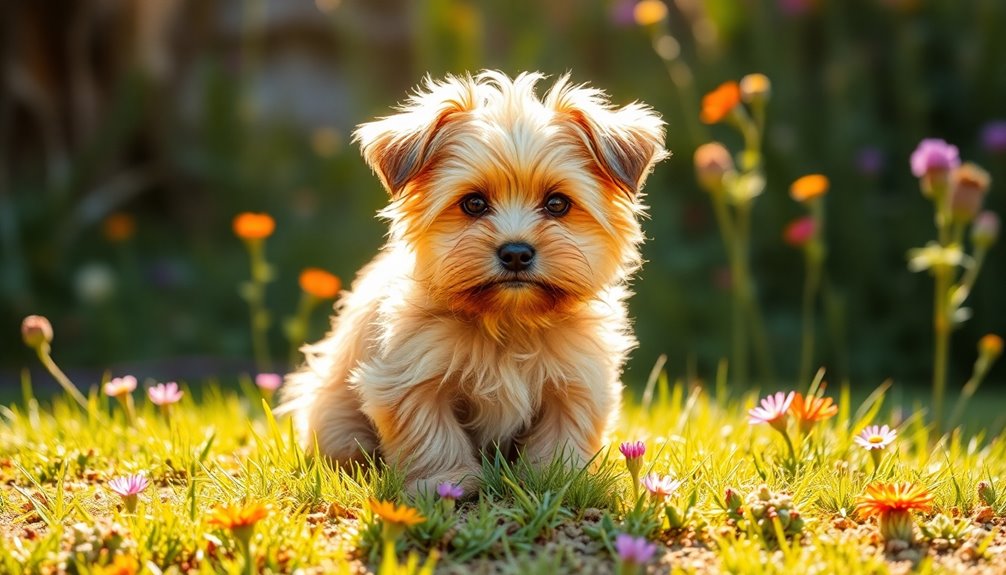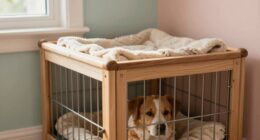The Miniature Schnauzer truly is a charming and versatile terrier. You'll love their affectionate nature and adaptability to various living situations, making them great companions for families or singles. Weighing between 11-18 pounds and standing 12-15 inches tall, they are perfect for apartment living, as long as there's access to parks. Their unique, hypoallergenic double coat features bearded muzzles and bushy eyebrows, requiring regular grooming. Daily exercise and mental stimulation keep them happy and healthy. If you're intrigued by their lively personality and care needs, there's so much more to discover about this delightful breed.
Key Takeaways
- Miniature Schnauzers are affectionate, lively, and adaptable, making them excellent companions for various living situations, including apartments.
- Their distinctive features include a bearded muzzle, bushy eyebrows, and a hypoallergenic double coat that requires regular grooming.
- This breed exhibits intelligence and playfulness, thriving on positive reinforcement training and early socialization for better interactions.
- Daily exercise of 30 to 60 minutes is essential for their physical and mental health, including activities like walks and interactive play.
- Miniature Schnauzers are prone to certain health issues, so regular veterinary check-ups and a balanced diet are crucial for their well-being.
Introduction
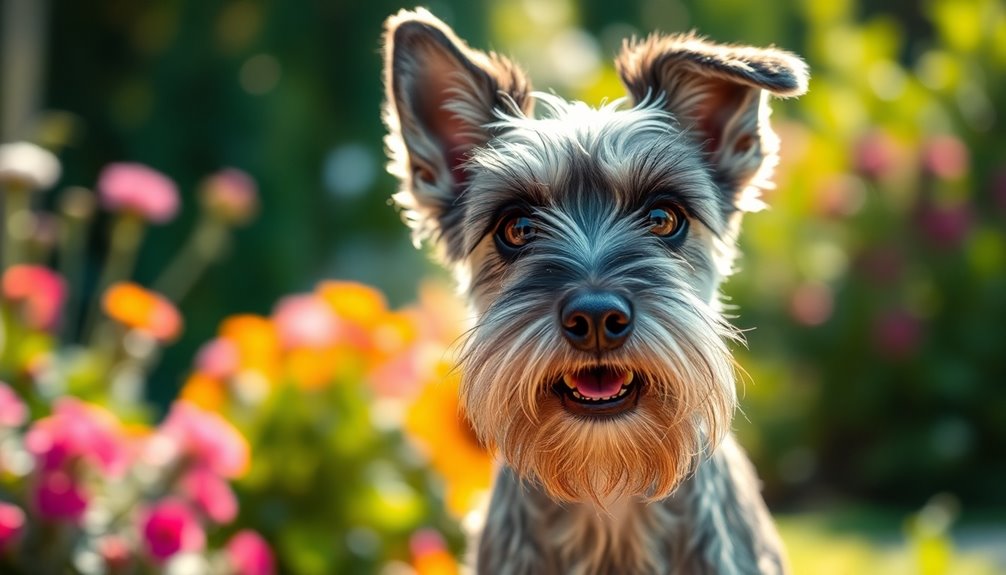
When it comes to choosing a dog that's both lively and affectionate, the Miniature Schnauzer Terrier stands out. This breed boasts a bright and vigilant temperament, making them an excellent companion for active families or individuals.
Their medium friendliness and pet-friendliness mean they can adapt well to different living situations, whether you're in a cozy apartment or a spacious home.
Known for their high intelligence and trainability, Miniature Schnauzers are eager to learn, which makes training sessions enjoyable for both of you. With a square-bodied build and a wiry coat, they come in colors like salt and pepper, black and silver, or black.
Weighing between 11-18 pounds and standing 13-14 inches tall, they're the perfect size for companionship. Additionally, they require at least one hour of daily activity to maintain their physical and mental health.
Their playful nature and high affection levels ensure that they thrive on interaction and playtime. However, be prepared for a bit of barking; they've a natural instinct to serve as watchdogs.
Additionally, early socialization helps them get along with unfamiliar dogs. Overall, the Miniature Schnauzer Terrier isn't only charming but also a versatile addition to any household.
History and Origin
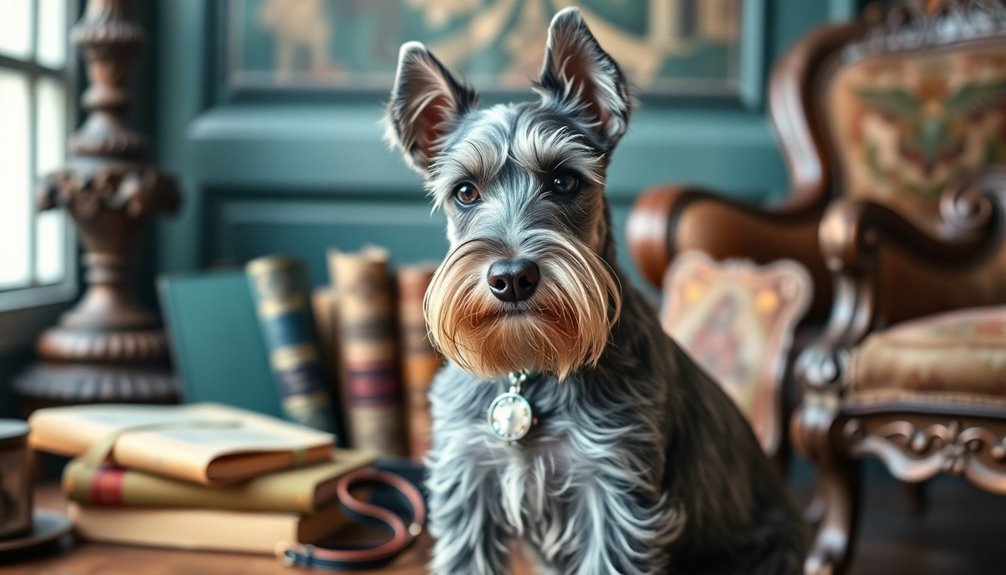
The Miniature Schnauzer originated in Germany, with its roots traceable back to the 15th century. Initially bred for rat-catching and farm guarding, these dogs quickly became valued for their versatility and alertness. This breed was developed from the Standard Schnauzer, along with contributions from Affenpinschers, Miniature Pinschers, and Poodles.
Where and when the breed originated
Originating in Germany, the Miniature Schnauzer has a rich history that can be traced back to recognizable images as early as the 15th century, where it was part of the broader Schnauzer lineage.
Initially known as "Dwarf Pinchers," these dogs debuted as the Wirehaired Pinscher at the 1879 Hannover show. The first Miniature Schnauzers were registered in 1899, marking a significant step in their development.
These charming little dogs were derived from Standard Schnauzers and crossed with Affenpinschers, Miniature Pinchers, and Poodles. This crossbreeding introduced smaller sizes and diverse colors, including liver, red/wheaten, and black and tan.
Early breeders actively experimented with various crosses to enhance specific traits, ensuring the breed's distinctiveness. Early breeding often involved interbreeding with the Affenpinscher and Miniature Pinscher to enhance breed traits.
In 1880, the first breed standard appeared in Germany, paving the way for further standardization.
The Pinscher Klub, established in Cologne in 1895, played a pivotal role in breed development, eventually merging with the Beyerischer Schnauzer Klub in 1918 to form the PSK.
Rat-Catching and Farm Guardian
Miniature Schnauzers have long been celebrated for their exceptional rat-catching abilities, making them invaluable companions on farms. Bred specifically to chase down rats, voles, and other small rodents, their compact frames allow them to navigate tight spaces, effectively hunting vermin in houses and barns.
With their thick beards, eyebrows, and wiry coats, these dogs are well-protected from bites during their pursuits. Their cropped ears and docked tails further prevent rats from seizing them, showcasing their unique design for this role.
Beyond their rat-catching skills, Miniature Schnauzers also serve as vigilant guardians on farms. They act as alert watchdogs, using their spirited nature to detect intruders and protect both property and livestock. Their intense hunting drive allows them to stay focused during their work, ensuring that no vermin goes undetected.
While they share similar roles with the larger Standard Schnauzer, their compact size makes them particularly adept in confined environments.
Their distinctive physical traits and behavioral characteristics—like their loyalty, independence, and eagerness to follow you around—make them not only effective hunters but also affectionate companions.
Miniature Schnauzers truly embody the essence of a working terrier, showcasing their versatility and charm in both farm and home settings.
Physical Characteristics
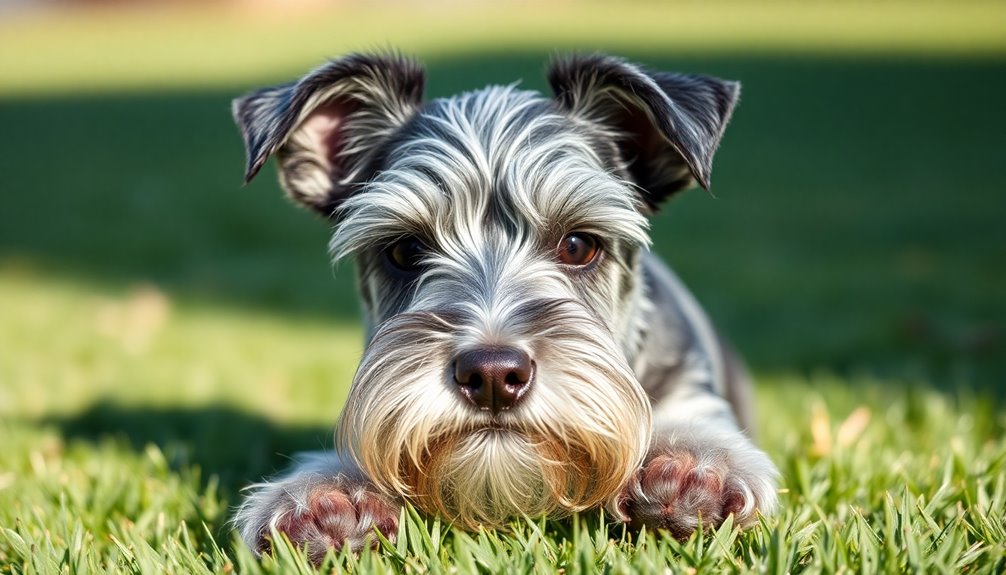
When you look at a Miniature Schnauzer Terrier, you'll notice their stocky build and compact size, typically standing between 12 to 15 inches tall. Their distinctive bearded muzzle and bushy eyebrows give them an expressive, alert appearance that's hard to miss. Plus, their wiry coat needs regular grooming to keep it looking sharp and healthy. These dogs also have a lifespan of 12-14 years, making them a long-term companion for families.
Size, weight, and coat details
The Miniature Schnauzer Terrier stands out with its compact size and distinctive coat. Typically, these charming dogs measure between 12 to 14 inches tall and weigh around 12 to 24 pounds. If you're looking for something smaller, consider the Toy-sized Miniature Schnauzers, which are 9 to 11 inches in height and weigh 6 to 11 pounds.
For an even tinier option, Teacup Schnauzers stand at just 6 to 8 inches and weigh between 2 to 5 pounds. Keep in mind that for show purposes, dogs under 12 inches or over 14 inches are disqualified. Miniature Schnauzers categorized as Miniature, Toy, and Teacup sizes highlight the breed's versatility and appeal to different owners.
When it comes to weight, newborn Miniature Schnauzers start off at 4 to 9 ounces. By the time they reach 4 months, they weigh about 6 to 10 pounds, and by 6 months, they're 75 to 85% of their adult weight, ranging from 8 to 17 pounds.
The Miniature Schnauzer features a double coat, which can be traditional, super, or mega. All coat types are hypoallergenic with minimal shedding, and they come in colors like black and silver, salt and pepper, and solid black.
Regular grooming helps reduce dander and maintain their unique appearance.
Bearded Muzzle and Bushy Eyebrows
Distinctiveness defines the bearded muzzle and bushy eyebrows of the Miniature Schnauzer Terrier, making it easy to recognize this breed. The muzzle features a flat bridge that runs parallel to the topskull, tapering slightly towards the nose. Its rectangular appearance comes from the long, thick whiskers and characteristic beard that adorn it. The darkly pigmented lips contribute to this overall striking look, while a black nose of good size completes the muzzle's charm.
Above the deep-set, oval eyes, you'll find the thick, bushy eyebrows that enhance the Schnauzer's expressive face. These eyebrows, matching the coat color, play a key role in the breed's human-like expressions. The flat, unwrinkled skull tapers slightly towards the muzzle, giving the head a rectangular shape from the front. Flat, clean cheeks without bulges further define this breed's facial structure.
When grooming, maintaining the natural shape of the beard and eyebrows is essential for showcasing their unique features. Proper clipper work and blending techniques help retain the angular appearance that's characteristic of the Miniature Schnauzer's charming visage. Additionally, ensuring that your Schnauzer is fitted with a well-ventilated basket wire muzzle during grooming can help prevent any unwanted biting while allowing for easy panting.
Temperament and Personality
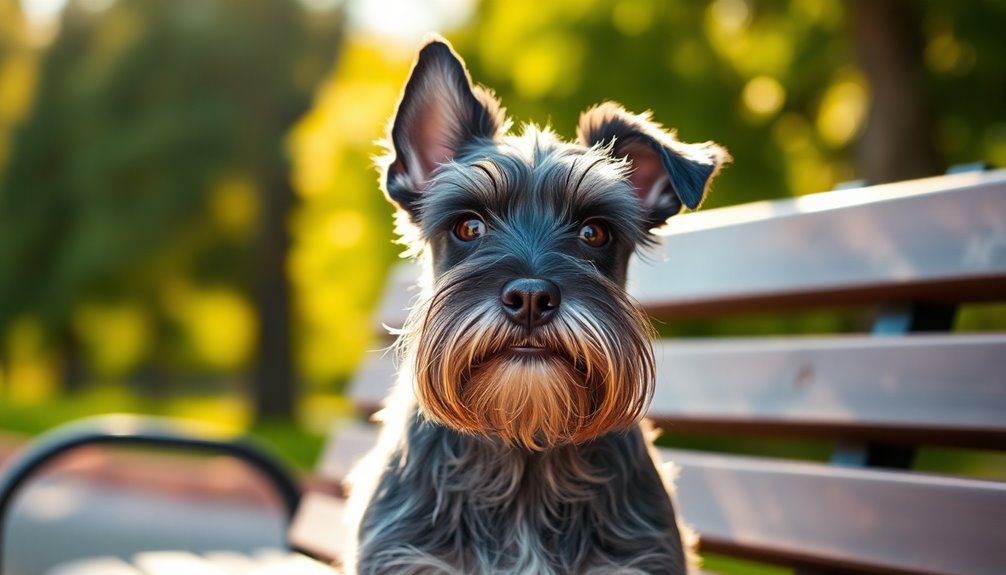
The Miniature Schnauzer Terrier is a playful and intelligent companion, making it a great fit for families or individuals alike. You'll find their loyalty and spirited nature adds joy to any household, whether you have kids or other pets. With proper socialization, they can thrive in various environments, showcasing their friendly personality. Their alertness and intelligence also make them excellent watchdogs, ensuring your home is well protected. Additionally, their emotional support can be beneficial for individuals facing challenges, as pets often provide comfort and companionship during difficult times.
Playful and Intelligent Companion
Miniature Schnauzers make for playful and intelligent companions, embodying a lively spirit that brightens any home. Their bright and vigilant temperament means they're not just affectionate; they truly enjoy playtime with their families.
Despite their small size, these feisty little terriers have a spunky nature that can surprise you with their energy and enthusiasm. They can easily switch from serious and introverted moments to playful extroversion, always ready to engage with you.
Their high intelligence makes training relatively easy, but remember, consistency and fairness are key. Using positive reinforcement techniques will help you get the best results, but be prepared for a bit of stubbornness, as they can be quite headstrong. These dogs are known for their trainability, making them capable of learning numerous tricks and commands.
These dogs require 30 to 45 minutes of exercise daily, so daily walks and off-leash play in a fenced area are essential. They thrive on mental stimulation, enjoying treat-dispensing toys and sniffing games that challenge their minds.
While they tend to bark frequently and can be alert watchdogs, early socialization will help manage their terrier traits, ensuring they fit well into your lifestyle.
Suitability for families, individuals, or other pets
These playful and intelligent companions fit well into various living situations, making them suitable for families, individuals, and even homes with other pets.
If you have kids, Miniature Schnauzers can be a fun-loving addition, especially if they grow up together. Just teach your children how to interact safely to avoid any conflicts. They may get protective of their favorite family member but remain friendly with everyone else.
For individuals, these loyal dogs thrive on companionship, preferring your company over that of other dogs. They adapt well to different living situations, including apartments, as long as you provide regular exercise and mental stimulation. Additionally, their high energy levels mean they will require daily walks and playtime to keep them happy.
When it comes to other pets, Miniature Schnauzers can coexist with cats if introduced early, but caution is needed with smaller animals like hamsters or birds due to their strong hunting instincts.
They can get along with other dogs if socialized from a young age, although introducing an adult Schnauzer to another adult dog can be tricky.
Health and Lifespan
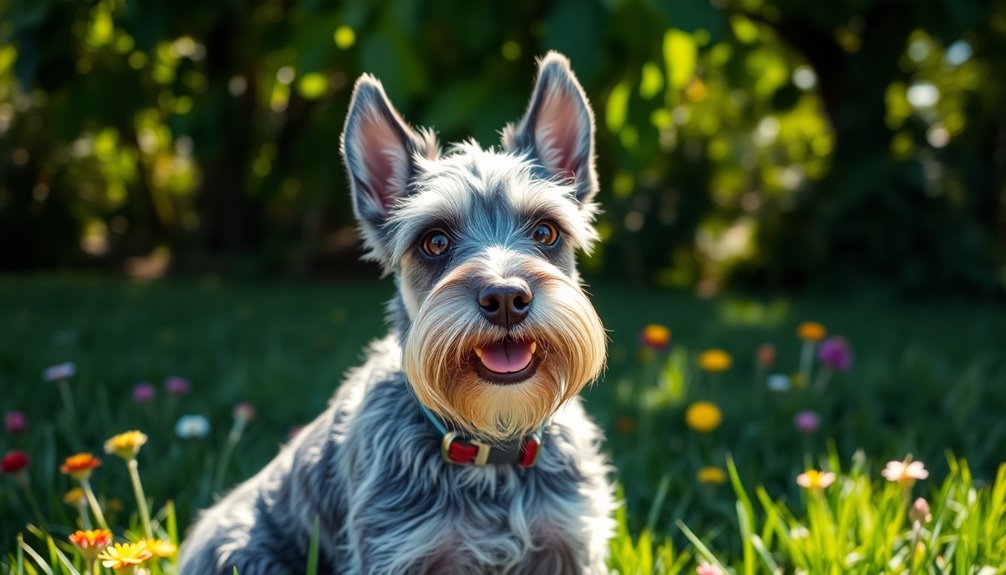
When it comes to your Miniature Schnauzer Terrier's health and lifespan, knowing that they typically live between 12 to 15 years is essential. You'll want to be aware of common health issues, like dental disease and heart problems, which can affect them throughout their life. Regular veterinary check-ups are crucial for monitoring their health and early detection of any potential issues.
Typical lifespan of the breed
Typically, the lifespan of a Miniature Schnauzer ranges from 12 to 15 years, with studies from the UK and Japan reporting averages of 13.3 and 13.4 years, respectively. While this breed generally lives longer than the average dog, which is about 12 years, various factors can influence how long your Schnauzer will be by your side. Diet plays a crucial role in determining lifespan. A balanced diet helps maintain a healthy weight, which can prevent obesity-related issues. Regular veterinary checkups are essential for monitoring general health and catching potential problems early, especially since elevated liver enzymes are a leading health concern for this breed.
Your Schnauzer's living environment and exercise plan also significantly impact their longevity; a stimulating environment and regular exercise keep them active and happy. Compared to similarly sized breeds, Miniature Schnauzers may live 1-2 years shorter, but they share a comparable lifespan with standard and giant Schnauzers. Interestingly, crossbreeds under 10kg often enjoy a longer average lifespan of 15.3 years.
Common health concerns or genetic predispositions
Miniature Schnauzers face several common health concerns and genetic predispositions that owners should be aware of. One significant issue is diabetes, which typically develops in older dogs around 9 to 10 years old. Symptoms include excessive thirst, weight loss, and cloudy eyes. Managing diabetes requires regular checkups and a healthy diet, with average treatment costs around $454.12. Legal guidelines regarding pet care and responsibilities can also affect owners' decisions when managing health issues.
Liver problems, particularly portosystemic shunts, are also a concern, where blood bypasses the liver, leading to abnormal behavior and seizures. Early detection through blood tests is essential.
Hemorrhagic gastroenteritis (HGE) can be life-threatening, causing vomiting and bloody diarrhea, demanding immediate veterinary attention.
Additionally, Miniature Schnauzers are prone to bladder or kidney stones, especially males, who are at three times greater risk. Symptoms like blood in urine and frequent urination warrant prompt vet visits.
Genetic predispositions include persistent Müllerian duct syndrome and degenerative myelopathy, leading to significant health issues. It's important to note that less than 95% of Miniature Schnauzers test clear for certain conditions, highlighting the need for genetic health testing.
It's crucial to stay informed and schedule regular vet checkups to catch these concerns early, ensuring your Schnauzer stays healthy and happy.
Tips for maintaining health and wellness
Maintaining the health and wellness of your Miniature Schnauzer is essential for ensuring a long, happy life. Regular veterinary care is crucial; schedule annual check-ups and vaccinations to catch health issues early. Blood tests can identify conditions like diabetes, while dental care, including brushing, prevents systemic diseases.
Don't forget parasite prevention—ensure regular checks and treatments.
Feed your Schnauzer a balanced, low-fat, high-fiber diet tailored to their age, weight, and activity level. Avoid table scraps to maintain dietary consistency and prevent pancreatitis.
Your Miniature Schnauzer also needs about an hour of exercise daily. Engage in walks, runs, and playtime to keep them physically and mentally fit. Activities like agility training or fetch can be both fun and beneficial. Just be mindful not to overdo it, especially with older dogs.
Finally, provide mental stimulation through interactive toys and training sessions to keep boredom at bay. Socialize your Schnauzer from a young age to prevent behavioral issues.
Care Requirements
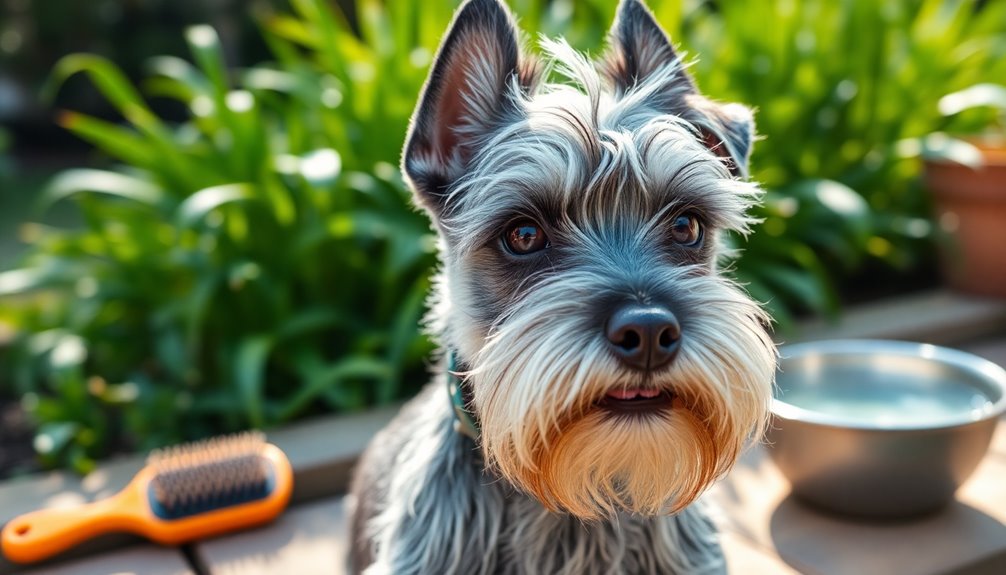
Caring for your Miniature Schnauzer Terrier means staying on top of their grooming, exercise, and diet needs.
You'll need to regularly clip their coat to keep it healthy and manage their energy levels with daily activities. Regular grooming, ideally every 6 weeks, is essential to maintain their unique double coat and prevent matting.
Feeding them a balanced diet and monitoring their intake will help prevent obesity and maintain their overall wellness.
Regular Clipping Required
To keep your Miniature Schnauzer looking sharp and healthy, regular clipping is essential. You'll need to groom your pup every 6 to 8 weeks to remove dead hair and maintain that signature appearance. Regular grooming helps maintain coat health and appearance, ensuring your Schnauzer stays in top condition.
Weekly brushing is crucial to prevent matting, and during their first 15 months, daily brushing can help avoid tangles. After that, aim for every other day.
For effective grooming, use a soft-bristled or slicker brush and a medium-toothed comb, especially for the legs and face. Comb the beard and leg furnishings a couple of times each week, brushing leg hair upwards.
Don't forget to check for small mats with a comb, and use detangling spray if necessary.
When clipping, use clippers with a #10 blade or an adjustable blade for various areas. Focus on the cheeks, under the throat, and down the chest. Trim the chin with scissors for a tidy finish, and avoid shaving—this helps keep that wire top coat texture.
For facial features, trim the eyebrows and beard carefully, ensuring enough length remains for a full look. Be sure to comb and cut eyebrows at a sharp angle while leaving the nose hair to grow for added fullness.
Exercise requirements and energy levels
Regular grooming keeps your Miniature Schnauzer looking sharp, but their overall well-being also hinges on proper exercise and energy management. Aim for 30 to 60 minutes of daily exercise to keep your pup fit and happy. For puppies under 6 months, stick to shorter sessions—about 5 to 10 minutes per month of age.
A mix of activities works best. Take them for brisk walks to explore their surroundings, engage in interactive play like fetch or tug-of-war, and consider off-leash time for some free-spirited running. Swimming is also a great low-impact option that's easy on their joints, especially as they age. Regular activity level is crucial for improving their overall health and well-being.
Don't forget about mental stimulation! Puzzle toys, obedience training, and learning new tricks can keep their minds sharp and engaged.
Be mindful of their health, too; consult your vet for tailored exercise guidelines. Always monitor your Schnauzer for signs of exhaustion, and avoid over-exercising, especially in young puppies to protect their growing joints.
Lastly, tailor exercise routines based on weather conditions to ensure their safety and well-being.
Feeding tips and diet recommendations
Feeding your Miniature Schnauzer the right diet is crucial for their health and vitality. Start with high-quality animal-based protein sources like beef, chicken, turkey, and fish. These proteins provide essential amino acids needed for muscle maintenance and overall energy.
Balance their diet with healthy fats for energy, and include small amounts of carbohydrates from vegetables and fruits for fiber and antioxidants. A species-appropriate diet ensures they receive the necessary nutrients to thrive.
For adult Schnauzers, aim for two to three meals a day, while puppies need more frequent feeding schedules. Monitor their caloric intake, which should range between 370 to 600 calories daily, depending on their weight and activity level.
Overfeeding can lead to obesity, so it's vital to measure their food accurately. Avoid harmful foods like alcohol, nuts, and onions, and consult your veterinarian for specific dietary needs, especially if your dog has health conditions.
Regularly check their weight and adjust their diet as needed to prevent health issues. Lastly, consider incorporating a natural, raw diet to mimic what dogs would eat in the wild, ensuring they receive the necessary vitamins and minerals for optimal health.
Training and Socialization
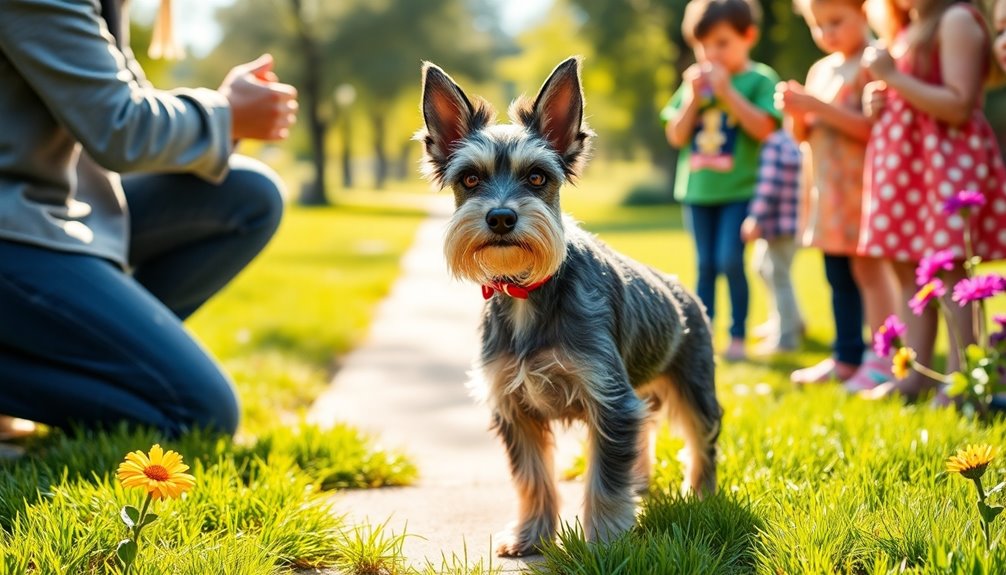
When training your Miniature Schnauzer Terrier, you'll find they're moderately responsive to commands, which makes consistent practice essential. To enhance their learning, incorporate reward-based training techniques that emphasize positive reinforcement and enjoyable experiences. Gradually introducing them to new environments helps build their confidence and adaptability. Additionally, be mindful of their diet, as certain foods like grapes are toxic and can lead to serious health issues. Don't forget to address leash pulling during walks, ensuring a more enjoyable experience for both of you.
Moderately Responsive to Commands
Training a Miniature Schnauzer requires patience and understanding, as these dogs are moderately responsive to commands. To effectively train your Schnauzer, focus on positive reinforcement by rewarding desired behaviors with treats, praise, or play. Consistent cues are essential; use clear commands and gestures to communicate your expectations.
Keep training sessions short and engaging, ideally around 10-15 minutes, to accommodate their shorter attention spans. High-value rewards, such as special treats or toys, can motivate your dog during these sessions. Start teaching basic obedience commands like sit, stay, and come early on, breaking down exercises into small, manageable steps. Recall training is essential for preventing dangerous situations and enhancing the bond between you and your Schnauzer.
Be prepared for stubbornness, and avoid frustration—consistency is key. Recognize their independent nature and strong prey drive when working on recall. Monitor your dog's progress and adjust strategies as needed. Celebrate small victories to maintain a positive training atmosphere.
Integrate training into your daily routine to reinforce behaviors. By using these techniques and emphasizing patience, you'll foster a well-trained, responsive Miniature Schnauzer who thrives on your guidance and affection.
Gradual Introductions to New Environments
Building on your training efforts, introducing your Miniature Schnauzer to new environments is key for their social development. Start early, ideally between 3 and 14 weeks, to ensure they experience a variety of people, dogs, and situations. Missing this window could lead to fear and anxiety later on.
Begin at home by exploring different rooms and surfaces. As your pup gains confidence, gradually venture outdoors to quiet areas like your backyard or familiar parks. Always prioritize safety; choose environments that feel non-threatening. Familiar items like toys or blankets can help provide a sense of security.
Introduce your Schnauzer to various sounds, starting softly and increasing complexity. Allow them to sniff around and gather information in new spaces. Controlled interactions with friendly, vaccinated dogs and diverse people are essential, rewarding calm behaviors with treats and praise. Additionally, ensure that your training sessions are kept short to maintain their focus and enthusiasm for learning short training sessions.
Keep an eye on their body language, adjusting exposure if they show signs of stress. End each session positively to avoid overstimulation. With gradual exposure, you'll help your Miniature Schnauzer develop into a well-adjusted, confident companion ready to tackle the world around them.
Leash Pulling During Walks
How can you ensure your Miniature Schnauzer walks calmly by your side? Start leash training early, ideally during puppyhood. Establish a regular training schedule to create consistency and prevent confusion. Use positive reinforcement techniques like treats and praise to encourage good behavior. Teach basic commands such as "sit," "stay," and "heel" to reinforce leash manners.
When your dog pulls, avoid yanking back; instead, stop walking and wait for them to relax before continuing. Reward loose leash walking with treats and praise. Practice short steps, rewarding your Schnauzer for following without pulling. Make it clear that pulling won't get them what they want. Building a strong foundation of Overall obedience is essential, as it helps your Schnauzer understand expectations while walking on a leash.
Focus on building your dog's attention and self-control during walks. Encourage eye contact and practice commands like "Leave It" to maintain focus. Reward them for calmly walking beside you.
Controlled socialization is also key; gradually expose your Miniature Schnauzer to other dogs and stimuli to reduce reactivity. Use positive reinforcement to redirect their focus and encourage calmness. Remember, socializing them to various sights and sounds will boost their confidence and help them walk nicely on a leash. Additionally, effective communication during training sessions helps strengthen the bond between you and your Schnauzer, making walks more enjoyable for both.
Ideal Living Environment

If you live in an apartment, you'll find that a nearby park can be a perfect setting for your Miniature Schnauzer Terrier. These dogs adapt well to smaller spaces, as long as they get regular exercise and mental stimulation. Plus, they can handle moderate heat, making them versatile companions for various living situations. Regular exercise is essential for their health, as they require 1 hour of exercise daily to stay happy and well-adjusted. Engaging them in activities that promote independence and exploration can further enhance their well-being.
Apartment With Nearby Parks
Living in an apartment with nearby parks is an ideal environment for a Miniature Schnauzer, as it provides the perfect balance of space and access to nature.
These dogs can adapt well to apartment living due to their moderate size and adaptable nature. However, they do need adequate exercise and mental stimulation to stay happy in smaller spaces. Regular exercise is crucial, as a lack of it can lead to behavioral issues.
Daily walks and play sessions are essential to meet their moderate exercise needs. Access to nearby parks allows you to incorporate outdoor activities like fetch and socialization with other dogs, which can significantly enhance their quality of life.
Keeping their minds engaged is just as important, so consider incorporating mental stimulation games into your routine.
Early and continuous socialization helps your Miniature Schnauzer adjust to living in close quarters with neighbors and other pets.
Their intelligence and loyalty make them great companions, but consistent training is crucial to managing their vocal tendencies, especially in an apartment setting.
Lastly, don't forget to prioritize their health with regular veterinary check-ups and a balanced diet to ensure they thrive in your urban environment.
Moderate Tolerance to Heat
When it comes to heat tolerance, Miniature Schnauzers require careful attention, especially in warmer climates. These dogs are more susceptible to overheating than humans, mainly because they cool themselves through panting and have sweat glands only on their foot pads. Overheating can lead to serious health issues like heat strokes, dehydration, and even death if not treated promptly.
Watch for warning signs such as vomiting, restlessness, and seeking cooler spots. To keep your Schnauzer safe, exercise them during the cooler parts of the day—early morning or late evening. Avoid peak heat hours and always check local dog walking forecasts. Ensure your dog has access to fresh, cool water at all times, using no-tip bowls or travel dispensers. Regular hydration is essential during hot months, so monitor their water intake closely.
Don't forget about sun protection! Miniature Schnauzers, especially those with thinner fur, can get sunburned easily. Provide plenty of shade in your backyard and consider using sunscreen made for dogs on vulnerable areas.
Distinctive Salt-and-Pepper Coat
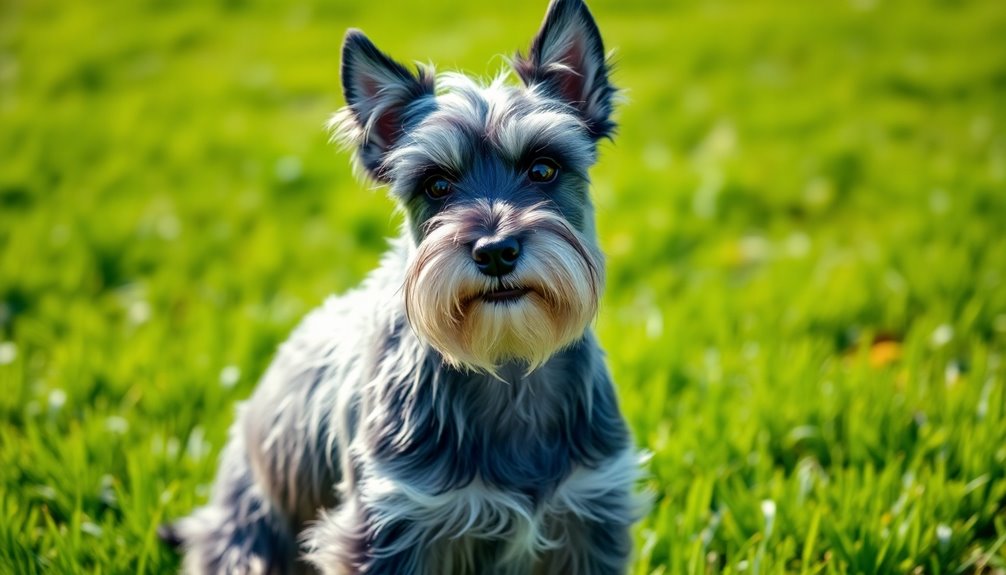
The distinctive salt-and-pepper coat of the Miniature Schnauzer isn't just visually striking; it also boasts hypoallergenic characteristics that make it a great choice for allergy sufferers.
You might notice this unique coloration highlighted in films like 'The Artist', where the breed's charm really shines. Additionally, this breed's coat structure contributes to reduced dander, ensuring a more comfortable environment for those sensitive to allergens.
Understanding these coat traits can help you appreciate the beauty and practicality of owning a Miniature Schnauzer.
Hypoallergenic Coat Characteristics
Although Miniature Schnauzers are known for their hypoallergenic qualities, their distinctive salt-and-pepper coat adds to their charm and appeal. This breed features a unique double coat, consisting of a wiry outer layer and a softer undercoat. The outer coat is dense and coarse, providing protection against dirt and moisture, while the undercoat helps regulate body temperature. Additionally, their compact size contributes to their versatility as both a family pet and a watchdog.
One of the standout hypoallergenic traits of Miniature Schnauzers is their low shedding. They don't shed hair like many other breeds, making them ideal for allergy sufferers. Regular grooming plays a crucial role in maintaining their coat and minimizing allergens. By brushing your Schnauzer daily, you help remove loose dander and keep their coat in top condition, reducing the chance of allergic reactions.
It's important to remember that while they're hypoallergenic, they're not entirely allergen-free. Allergic reactions can still occur due to proteins in their dander, hair, and saliva.
However, many people with allergies find that they tolerate Miniature Schnauzers well, making these charming dogs a great choice for those sensitive to allergens.
Featured in 'The Artist
While many dog breeds boast unique coats, the Miniature Schnauzer's salt-and-pepper coloring truly stands out, capturing attention and admiration. This distinctive coat arises from a genetic banding pattern, specifically the black-based agouti pattern. You'll notice shades ranging from light silver to black, with guard hairs often tipped in black, creating a striking appearance.
When clipped, the undercoat reveals even more color nuances, which can range from silver to nearly black. Puppies typically start with darker coats and pale tan tones that fade as they mature. A dark stripe along the spine adds to their charm, especially in those with a pale silver undercoat. Additionally, the genetic factors determining the salt-and-pepper coat color play a crucial role in breeding healthy Miniature Schnauzers.
The salt-and-pepper coat is the most recognized color for Miniature Schnauzers, accepted by the AKC and FCI. Initially, the breed standard only acknowledged this color, emphasizing its traditional roots.
The breed's history traces back to Germany, where it was developed for hunting small rodents, showcasing its utility alongside its aesthetic appeal. The Miniature Schnauzer's unique coat not only adds to its charm but also reflects its rich heritage, making it a beloved companion today.
Active Lifestyle Compatibility
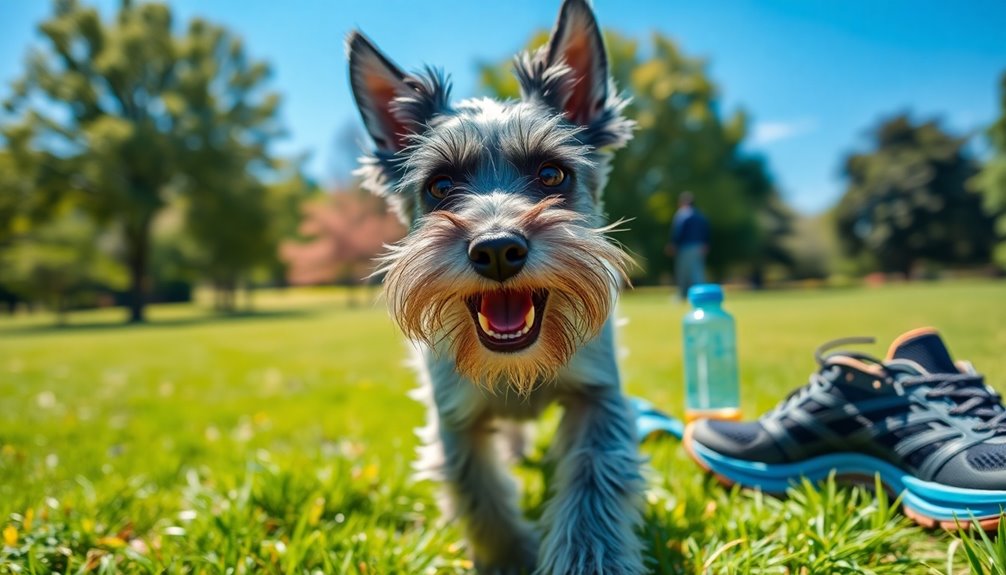
If you're looking for a family-friendly companion, the Miniature Schnauzer fits right in with an active lifestyle.
They adapt well to various living situations, whether you're in an apartment or a house, as long as they get their daily exercise.
With their alert and spirited personality, these dogs bring a lively energy to any home.
Just remember, keeping their coat groomed is essential to maintain their distinctive look and health.
Family-Friendly and Adaptable Companion
Miniature Schnauzers make excellent family-friendly companions, especially for active households. Their affectionate nature and loyalty make them a perfect fit for families, particularly when they grow up with children. However, supervision is essential to ensure safe interactions between your Schnauzer and kids. Regular family interaction is vital; without it, they can feel isolated.
Early socialization and training are crucial for your Miniature Schnauzer to thrive. They're intelligent and easily trainable, but they can become bored with repetitive training. Using positive reinforcement and keeping training sessions short helps maintain their interest. Additionally, exposing them to new people, dogs, and environments aids in developing a calm temperament. Regular grooming needs help also ensure they remain comfortable and healthy as part of the family. Proper puppy socialization is key to their adaptability and confidence.
When it comes to exercise, Miniature Schnauzers need regular activity to stay healthy and happy. Daily walks and play sessions are essential, and they can thrive in various living situations, including apartments. Just ensure they get enough exercise to manage their energetic nature.
While they adapt well to different environments, a fenced yard is a good idea to curb their chase instinct. With proper supervision and mental stimulation, your Miniature Schnauzer can be a delightful and adaptable family member.
Grooming Needs and Maintenance
To keep your Miniature Schnauzer looking its best and feeling comfortable, regular grooming is essential, especially for those with an active lifestyle. Aim for grooming every six weeks to maintain their coat and schedule consultations to discuss styles and treatments.
You'll want to bathe your pup monthly, using dog-friendly or breed-specific shampoo, and brush at least 3-4 times a week to prevent matting.
For Miniature Schnauzers, you can choose between hand-stripping and clipping. While hand-stripping maintains the traditional look, clipping is more common, featuring a schnauzer clip with shorter hair on the top and longer on the legs and stomach.
Pay special attention to the beard, eyebrows, and furnishings to keep that signature appearance. Regular brushing is crucial to prevent matting, as the coat does not shed unless the dog is sick.
Integrate grooming into your routine by brushing daily, especially for puppies transitioning to their adult coat. Active dogs benefit from shorter furnishings on their legs to reduce maintenance.
Regular brushing at home complements professional grooming, ensuring your Schnauzer looks great and stays comfortable. Consistent grooming helps prevent skin issues and keeps your energetic companion healthy and happy.
Frequently Asked Questions
How Do Miniature Schnauzers Fare With Children and Other Pets?
Miniature Schnauzers generally do well with children, especially if you socialize and train them early.
Their energetic nature matches kids' playfulness, but you'll need to supervise interactions to prevent accidents.
When it comes to other pets, they prefer being the only one but can get along with cats or dogs if introduced properly.
Ensure interactions are slow and positive, and always monitor their behavior to foster a harmonious environment.
What Grooming Tools Are Essential for Miniature Schnauzers?
For grooming your Miniature Schnauzer, you'll need several essential tools.
A slicker brush helps remove loose fur and prevent mats, while a pin brush maintains their wiry coat.
Use a dog comb for detangling and thinning shears for shaping.
Electric clippers are great for trimming, and mini clippers work well for detailed areas.
Don't forget organic shampoo for baths and a good hairdryer to keep your pup's coat healthy and fluffy!
Are Miniature Schnauzers Hypoallergenic?
Yes, Miniature Schnauzers are generally considered hypoallergenic due to their minimal shedding and low dander production.
However, if you're sensitive, you might still experience allergic reactions since they produce proteins in their dander, saliva, and urine.
Regular grooming, such as brushing and bathing, helps reduce allergens, making them a better choice for allergy sufferers.
Just keep in mind that every individual's reaction can vary, so pay attention to your body's response.
What Is the Average Cost of a Miniature Schnauzer?
The average cost of a miniature schnauzer typically ranges from $500 to $2,500, depending on several factors.
If you choose a reputable breeder, prices can go up to $3,000, especially for those with champion bloodlines.
Regional variations also play a role; for instance, prices in the Northeast can reach $3,500.
Alternatively, adopting from a rescue organization can cost between $50 and $400, making it a more affordable option.
Can Miniature Schnauzers Adapt to Apartment Living?
Absolutely, Miniature Schnauzers can adapt to apartment living quite well!
Their moderate size and friendly disposition make them great companions in smaller spaces.
Just ensure you provide them with at least 30 to 60 minutes of daily exercise and mental stimulation to keep them happy.
Regular walks, playtime, and some training will help prevent unwanted behaviors.
With a cozy spot to rest and play, they'll thrive in your apartment!
Conclusion
In conclusion, the Miniature Schnauzer is a delightful companion, blending charm with versatility. Their unique appearance, lively personality, and adaptability make them perfect for various lifestyles. Whether you're enjoying a cozy night in or an active day outdoors, these spirited terriers fit right in. With proper training and socialization, you'll find that they not only thrive but also bring endless joy to your life. Consider welcoming a Miniature Schnauzer into your home and experience their wonderful companionship!



